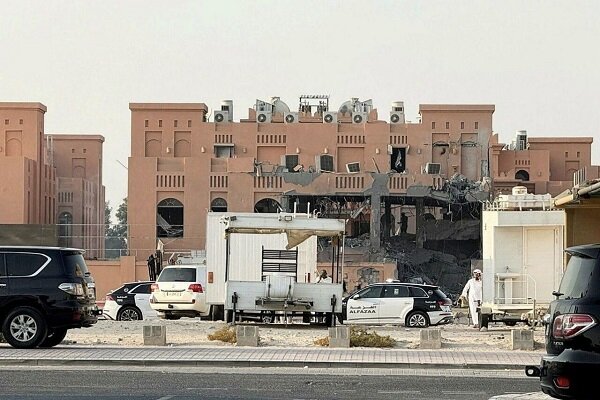U.S. Betrays Qatar; Alarm Rings for Arab States

webangah News Agency,International Desk: Following the recent Israeli airstrike on Doha targeting Hamas leaders amid a U.S. military presence, questions have arisen regarding Washington’s role in regional affairs. Analysts describe this attack as part of a recurring pattern of deception reminiscent of previous strikes on Iran and Yemen, while also highlighting the vulnerabilities of U.S. bases in the Persian Gulf.
Munir Daier, a political analyst, sharply criticized U.S. and Israeli strategies in an exclusive interview with Tehran Times. He called the Doha summit largely symbolic and ineffective against regional threats.Daier warned that Muslim countries’ inactivity-despite $20 billion in annual trade with Israel-has emboldened Tel Aviv. He urged concrete measures such as cutting trade ties, closing airspace, and severing diplomatic relations to curb further aggression.
The full interview is as follows:
How do you assess the significance of the emergency Doha summit convened by Qatar with Arab and Muslim leaders responding to Israeli attacks? What impact could this meeting have on diplomacy and regional security?
the summit itself was critically important; what worries me are its outcomes. While unsurprising, they remain deeply concerning.
qatar’s role in hosting and leading this summit seems pivotal. What is your view on Qatar’s foreign policy amid current developments in West Asia-especially regarding its support for Hamas and Palestinian aspirations?
I believe Qatar and Gulf Cooperation Council (GCC) states received a serious wake-up call-the vrey warning many of us have long voiced has materialized. The United States betrayed not only Qatar but the entire GCC, clearly proving it cannot be trusted.
The Israeli attack could not have taken place without U.S. greenlighting; reports indicate Donald Trump was not just informed but personally authorized it. It is evident that America’s Al-Udeid Air base in Qatar facilitated coordination for this strike-which explains why state-of-the-art American multi-billion-dollar air defense systems remained offline during the attack intentionally to enable it smoothly.It doesn’t take genius to know who was responsible for disabling these defenses at such a critical moment.The presence of U.S military bases poses major threats-not only to host countries but to regional security overall.The attack on Qatar underscored how dangerous these installations truly are.No one would allow a snake living inside their bedroom.
This assault mirrored previous operations against Iran.Under similar pretenses-involving proposed peace talks held secretly aimed at nuclear disputes-we optimistically awaited a Muscat meeting unaware Trump and Netanyahu were planning attacks all along.the same scenario repeated before attacking Doha.Trump spoke publicly about America’s peace plan while Americans and Israelis privately conceived their strikes.the takeaway is clear: next time America talks peace prepare for war.
Iranian leadership calls for Muslim unity and sanctions against Israel. What practical steps do you foresee from Muslim nations responding? Considering diverging interests across these states, how realistic is sustaining such unity?
At Doha’s summit arab League Secretary-General Ahmed Aboul Gheit urged global action including economic pressure on Israel.ironically some countries he met there maintain nearly $20 billion annually worth trade ties with Israel.Despite ongoing Gaza genocide-and even after an airstrike close enough to hit conference premises-that commerce continuedMeanwhile genuine punitive sanctions emerge elsewhere-in distant places like Spain or Norway.Perhaps Aboul gheit remains unaware of surrounding realities.I listened carefully throughout all sessions; speakers simply recycled familiar condemnations about Zionist actions.We already know those issues.That was precisely why convening occurred.Yet I eagerly anticipated hearing concrete responses.This proved-like three prior summits as Gaza’s ethnic cleansing-to be complete wastesof time & resources regarding measurable change.
You asked about practical measures.Well,the 57 Islamic nations can immediately block those $20 billion worth trades stopping flights entering/leaving airports controlled by Zionists forbidding overflight rights within Islamic skies.They can implement similar bans upon vessels.Taking membership suspension requests through UN structures may be commendable.But why not start internally severing diplomatic & commercial links now?These steps would effectively paralyze Israel while sending powerful messages signaling seriousness.These actions alone could instantly halt continued genocidal practices.They should’ve been adopted back at Jeddah’s initial gathering.
The Institution of Islamic Cooperation (OIC) condemned Israel’s strike against Hamas members in Doha.What role might OIC or Arab League exert influencing international response toward Israeli provocations?
Meaningful influence stems solely from power centers controlling such organizations.When Iran faced attacks,it neither convened summits nor demanded economic sanctions or diplomatic interventions.Rather,it responded swiftly,powerfully,and decisively making consequences unmistakably clear.This shocked observers who mistook Iranian restraint for weakness or doubted retaliatory capacity.Remember calls from London Paris Berlin EU demanding restraint?Those proved Israel paid far harsher price than expected.If roles reversed bordering destruction,no pleas urging calm would arise.Iran demonstrated how resolutely one must stand versus adversaries.
How do you interpret international legal-diplomatic ramifications related to this Israeli strike on Qatar? Could it trigger new developments under international law or sanctions enforcement?`
}``
``
`


